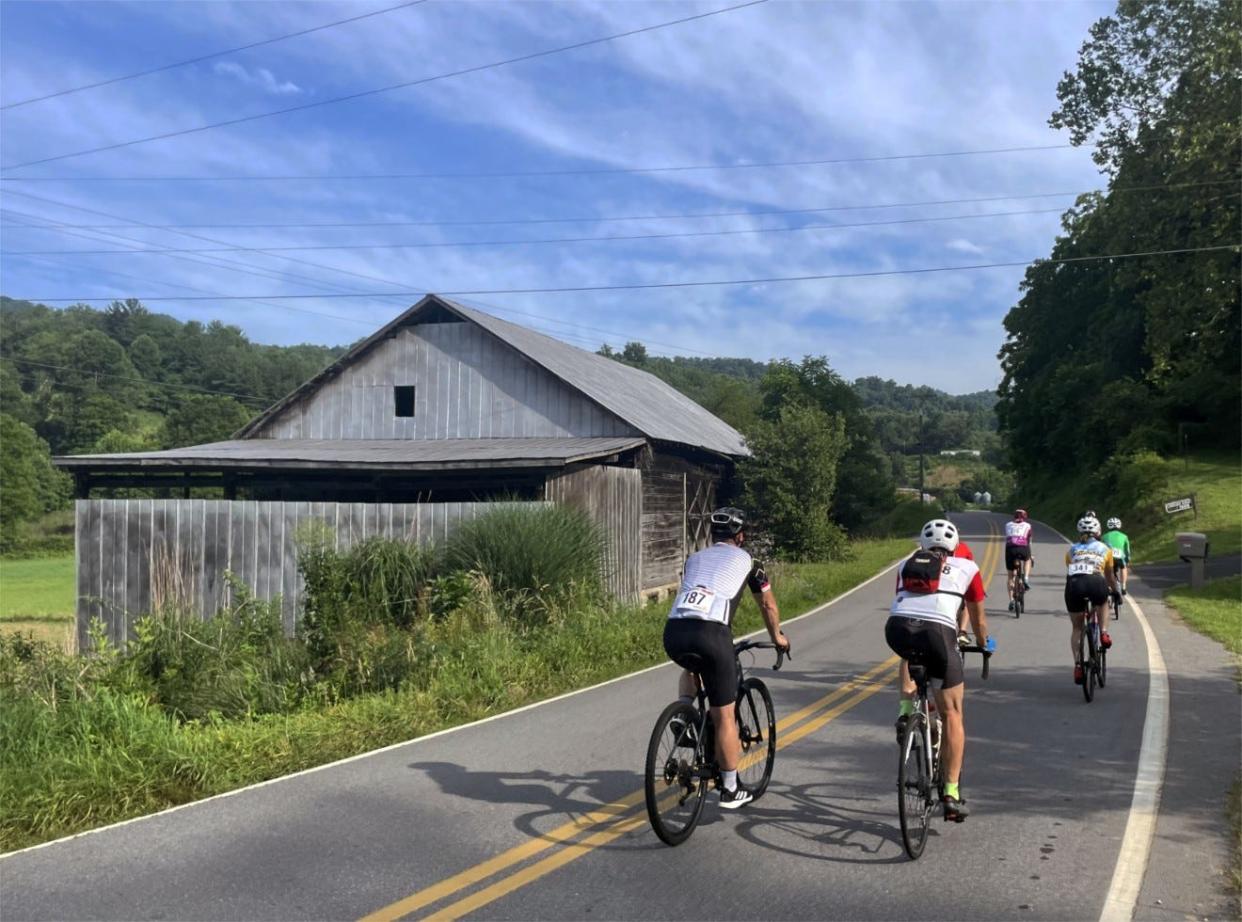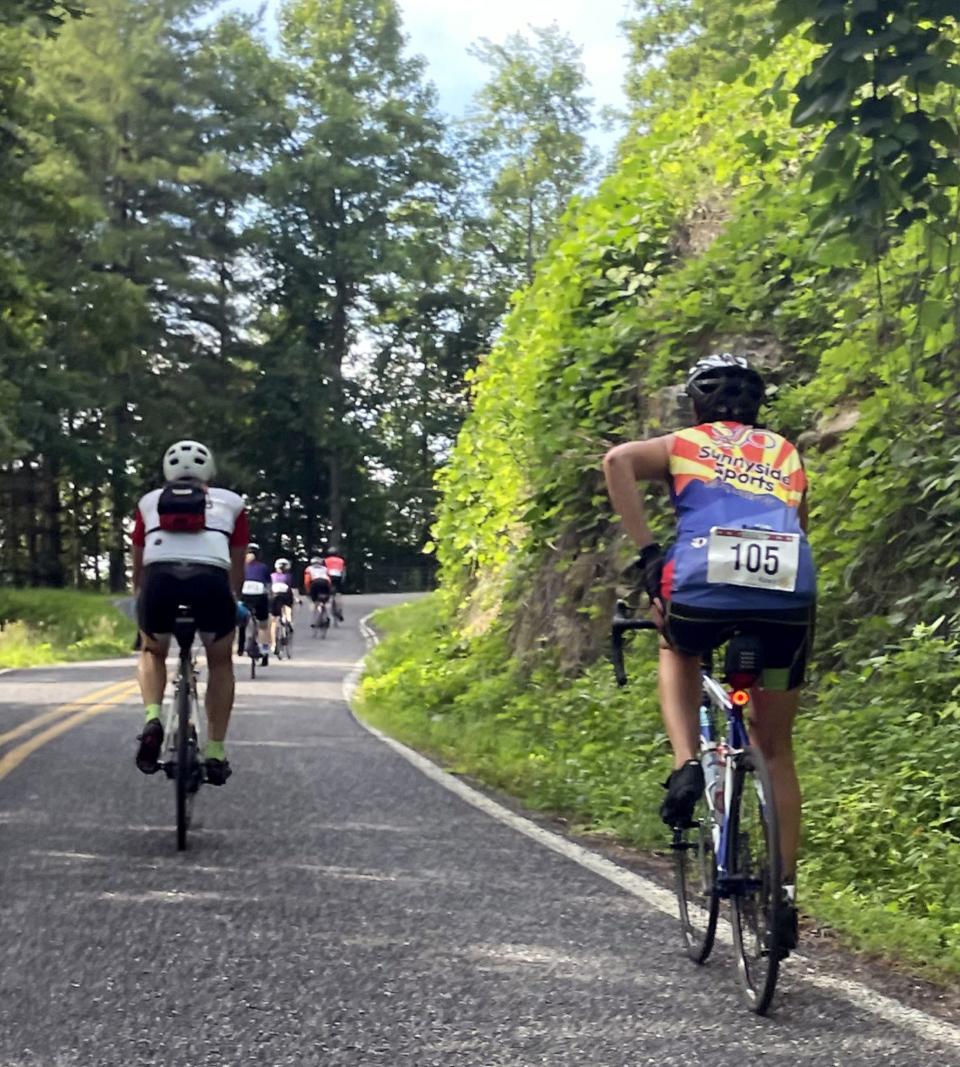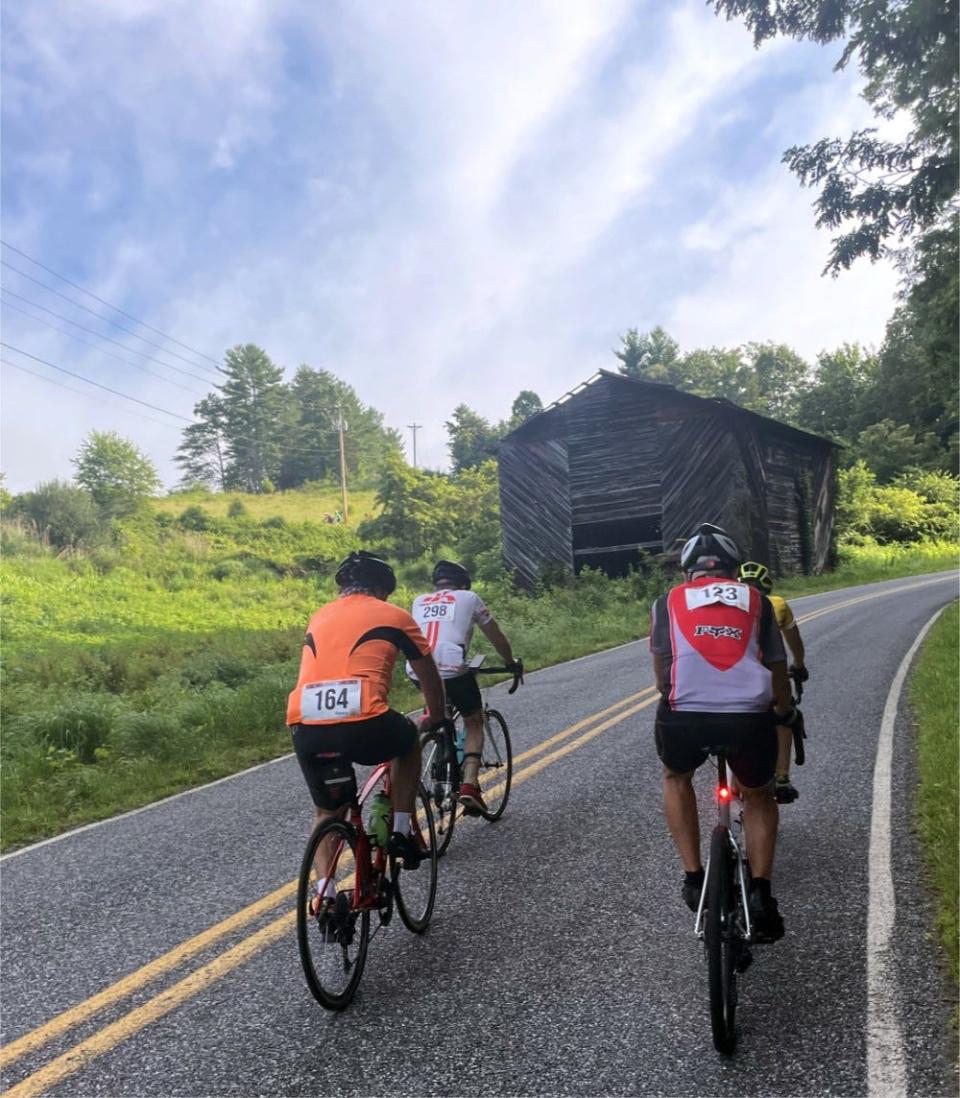This Madison County bike ride had 294 participants and still managed to go plastic-free

MARS HILL - Organizing a 100-mile bike ride with nearly 300 participants can result in a lot of environmental waste, but the local Rotary Club decided it didn't have to be that way.
On July 8, the Rotary Club of Madison County held its 17th annual Hot Doggett 100, which has routes for riders to participate in 30-, 67- and 100-mile rides.
While the Madison County Sheriff's Office and local town police departments provide lead cars for riders in the event, which starts and ends at Mars Hill University, the Rotary Club and its sponsors provide drinks, fresh fruit, protein bars and other unique snacks and treats, as well as a post-ride meal.
Rotary Club member Mike Foster has served as rest stop coordinator since 2018. According to Foster, there are seven rest stops spanning from Spring Creek to Sam's Gap. Each rest stop offers riders drinks and snacks to fuel them along the way.
"Clean water has always been the staple of any endurance sport, whether pure H2O or the basis for Gatorade or other electrolyte replenishing sports drink. It is my responsibility to plan, purchase, organize and distribute all of the rest stop supplies to each of my seven rest stop managers, including and most importantly water. Each rest stop is typically provided with between 15 and 25 gallons of water. Over the last several years, we have used a combination of refillable 5-gallon jugs of water and hundreds of 16.9-ounce single-use bottles."
Within the past few years though, growing concerns about the ride's environmental impact caused the Rotary team to reassess its operations.
"Keeping these bottles cool and ready to grab by the riders was a convenient method of distributing water, but over the last few years, as environmental concerns among the club and the general public have grown, we’ve become more conscious of our environmental impact," Foster said. "Even though we attempted to recycle the bottles using the county-provided recycling bins, this effort proved largely fruitless in the end, as many of the bottles ended up in the trash."

Connie Molland is a past chair of the Hot Doggett 100 and serves as district governor-elect for Rotary Club of Madison County.
While Rotary International only officially adopted the environment as one of its seven areas of focus in June 2020, many clubs – including the Rotary Club of Madison County – were already doing projects related to the environment, Molland said.
"Our club has adopted a highway in Mars Hill almost since our inception, members have helped create the butterfly Bird Garden at the Marshall Library, and members have helped build restore native plant riparian barriers habitat along Gabriel's Creek. Several years ago at a Hot Doggett Committee meeting, Peggy Barnes, a long-time member of the club, mentioned that we need to stop using styrofoam for the rest stops and the post-ride meal."
After Barnes' styrofoam ban initiative caught on, Molland said she turned her attention to doing away with single-use water bottles at the Hot Doggett ride.
"Cycling events like the Hot Doggett have been going on long before single use water bottles existed," Molland said. "I kept asking the question, 'What did events do before single use water bottles existed?'"
According to Molland, Barnes, whose daughter owns HomeGrown Restaurant in Asheville, turned her attention to the plastic utensils.
"HomeGrown uses flatware that is SpudWare, made from potatoes, biodegradable, which are compostable and reusable. Barnes worked to get the Hot Doggett to agree to get away from the plastic utensils, and HomeGrown agreed to procure them from their supplier for us to use," Molland said.

Reduction in single-use water bottles
In 2018, the team distributed more 800 single-use bottles at the Hot Doggett rest stops alone, according to Foster.
Due to an increased awareness of the waste, in 2019, that number decreased to about 450 bottles, Foster said.
While the event was canceled due to COVID in 2020, in 2021 the Hot Doggett team distributed roughly 175 single-use bottles, a stark decrease from the previous ride.
But this year, the staff was able to carry out an event with zero single-use bottles.
The elimination of the single-use bottles came in an event that had 294 registered riders, up from 271 last year.
Going plastic-free was no small task, according to Molland, as the ride spans 130 miles.
"The Hot Doggett has nine supply and gear (SAG) vehicles on the road that have to be prepared with water if they pick up a cyclist," Molland said. "And when the cyclists cross the finish line, they are handed a bottle of ice cold water and an ice cold wet towel. Late last year, an offer came in to provide us with 500 brand new water bottles that had been given to the Downtown Asheville Racing Co (DARC). This was what we needed to replace the remaining single use water bottles in the SAG vehicles and at the finish line."
Molland said trash removal and recycling "are a part of everyone's responsibility."
"If we work towards thinking about ways to reduce the amount of trash and recycling that we create, we can reduce the overall cost associated with that removal," Molland said.
Molland hopes the plastic-free initiative translate throughout the county and region.
"This is not an initiative that will happen overnight, but it's wonderful to see when baby steps get taken," Molland said. "It would be awesome to attend a county commissioner meeting and see all of the commissioners using reusable water vessels, as one is already using his own water bottle.
"From Land of Sky Regional Council Waste Reduction programs, the 'Three R's' are 'reduce, reuse, recycle,' but we can also think of adding the word 'refuse' to the beginning of this list. The more people who say, "No thanks, I'm trying to quit" when offered a single-use water bottle, the more the message will get out there."
Madison County resident Devi Sharp recommends these 10 practices to help reduce environmental waste:
Eliminate use of single serving water bottles.
Switch to powdered laundry detergent to eliminate plastic bottles.
Bring reusable tote bags to the grocery store and use them.
Avoid cosmetics and beauty products with microbeads - these don’t degrade.
Use bar soap, shampoo and conditioner.
Buy bulk grains and anything thing else. Buy bulk mushrooms rather than mushrooms in a plastic tub.
Use glass containers in lieu of zip-locks.
Avoid plastic packing from the grocery store - for example some eggs come in plastic containers.
Avoid plastic produce bags - buy reusable bags. This is hard because these bags are very handy in the house.
Repurpose the plastic bags that do come into your house. For example the bag that carrots come in are good for other produce such as lettuce.
For more information on the Hot Doggett 100 and its numerous sponsors, visit its website.
This article originally appeared on Asheville Citizen Times: Hot Doggett goes plastic-free in ride spanning Spr. Creek to Sam's Gap

